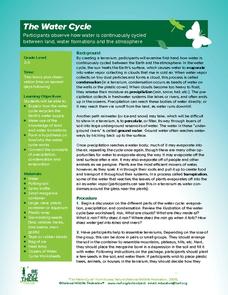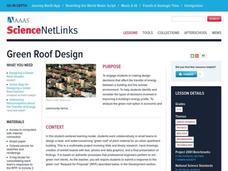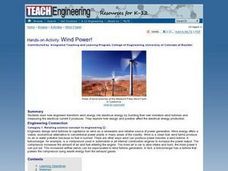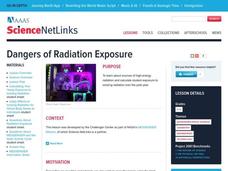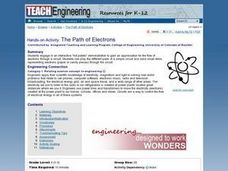Curated OER
The Water Cycle
Young scholars are introduced to the components and importance of the water cycle. They are shown how groundwater moves using a model. Students list 9 places on earth where water is found. They define the terms cycle and water cycle.
It's About Time
States of Matter: Solid, Liquid, and Gas
Solid, liquid, and gas: they all matter. Scholars create an animation of the various states of matter, experiment with the temperature of water as it changes states, and observe carbon dioxide as it changes states. The lesson also...
Kenan Fellows
How Much Heat Can a Phase Change Produce?
Scholars learn about heat release in phase changes. They perform calculations as they compare and contrast a science fiction passage and a home heating application.
Science NetLinks
Green Roof Design
Green roofs aren't just eco-friendly — they are literally green with trees. Groups learn about the concept of green roofs in order to be able to design one. The groups design a 5,000-square-foot green roof for a fictional apartment row...
Oregon State
World Map of Plate Boundaries
Young geologists piece together the puzzle of plate tectonics in an earth science lesson. Given a physical map of the world, they search for land formations that indicate the location of different types of plate boundaries.
Curated OER
Falling Water
Students drop water from different heights to demonstrate the conversion of water's potential energy to kinetic energy. They see how varying the height from which water is dropped affects the splash size. In seeing how falling water can...
Curated OER
Thar She Blows!: Wind Power
Students examine how wind energy is transformed into electrical energy. In pairs, they build miniature wind turbines and measure how much electrical current they produce. They asses the importance of design and position in energy...
Curated OER
Simple Thermodynamics of Transportation
Young scholars watch videos about various modes of transportation, they examine the energy transformations that occur in each, and they be introduced to the laws of thermodynamics.
Curated OER
Dangers of Radiation Exposure
Students calculate their yearly exposure rate to harmful high-energy radiation and cumulative effects over time. They use the information to evaluate the various sources of radiation that are of greatest concern for them.
Curated OER
Acceleration, Drag, Gravity, Motion, Forces, and Friction
Eighth graders build and run mousetrap cars in order to measure distance, time, and mass for their cars. They use these measurements to calculate average speed and kinetic energy, then create a slide show to visually explain how the car...
Curated OER
The Path of Electrons
Students engage in an interactive "hot potato" demonstration to gain an appreciation for the flow of electrons through a circuit. They role play the different parts of a simple circuit and send small items representing electrons (paper...
CK-12 Foundation
Power Lines
How does electricity travel through power lines? The simulation demonstrates the how changes in voltage and resistance are related to the distance between power polls and the thickness of the cable. Scholars control three variables in...
CK-12 Foundation
Electric Analogies
We can see the result of electricity but not the process itself. The simulation compares electric circuits to a water tower and water wheel cycle. Young scientists adjust the height of the tower, the amount of resistance, and if the...
Bonneville
Introduction to Circuits
Light up the class's knowledge. Pupils build a simple circuit using a battery, wire, and a light bulb and create a diagram of their circuit. The teacher provides a short lecture on a complete circuit, calling attention to the direction...
Purdue University
Can You Design a Hot or Cold Pack?
You're getting warmer. Groups conduct an experiment to determine which of four chemicals are in hot/cold packs. They learn about exothermic and endothermic reactions and use this knowledge to design a hot/cold pack that is small enough...
Curated OER
Plate Tectonics: First Grade Lesson Plans and Activities
A set of first grade geology lessons focuses on plate tectonics and movement of plate boundaries. During the pre-lab, learners experience three types of plate movement through a kinesthetic demonstration. The lab demonstrates stresses...
Bonneville
Wind Power: A Hands on Experience
Turn a learning experience into a fun instructional activity. Future engineers create blades for a wind turbine using card stock. Using a fan, they test how well the blades help the wind turbine turn. The goal is to build blades that are...
Curated OER
Understanding Power using Kirchhoff’s Rules
Twelfth graders cite real life applications of Kirchhoff's rules. In this physics lesson, 12th graders calculate current, power and voltage using Kirchhoff and Ohm's laws. They explain the different components and uses of transformers.
Curated OER
The "Coal LIfecycle" Scrapbook
Students discover how coal is formed. In this science lesson, students create a scrapbook on the life cycle of coal and show how coal is formed by showing pictures of each stage.
Curated OER
the biggest Plates on Earth
Students understand the movement of tectonic plates. In this tectonic plates lesson, students access prior knowledge of convergent, divergent, and transform boundaries. Students discuss energy transfer involved in plate motion. ...
Curated OER
Magnetism
In this magnetism worksheet, students review concepts relating to magnetic fields, transformers, galvanometers, and electric motors. This worksheet has 9 fill in the blank and 11 short answer questions.
Curated OER
Body Movement
Second graders interpret and transform drawn lines into locomotive movements. In this improvised movement lesson, 2nd graders draw a line on a piece of paper and use the elements of dance to interpret and transform their draw line into...
Curated OER
Circle of Life
Students consider why we eat and where our food obtains its energy. They illustrate food chains that might be found on an open field, dissect owl pellets, identify the remains of animals in the pellets, watch videos and participate in...
Curated OER
Connect the Species
Fourth graders, in pairs, explore energy transfer and species interrelationships by viewing slides on a microscope. hey explore phytoplankton (producers) and zooplankton (consumers)
Other popular searches
- Energy Transformation
- Energy Transformation Lab
- Energy Transformation Unit
- Energy Transformation System
- Energy Transformation Graph
- Solar Energy Transformation
- Energy Transformation Home
- Suns Energy Transformation
- Work = Energy Transformation
- Life Energy Transformation


